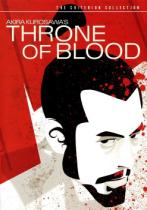Kumonosu jô
 Year:
Year: 1957
Film Studio: Toho
Genre: War, Drama
Length: 109 Min.
DirectorAkira Kurosawa (1910)
WritingShinobu Hashimoto (1918)...Writer
Ryûzô Kikushima...Writer
Akira Kurosawa (1910)...Writer
Hideo Oguni (1904)...Writer
ProducerAkira Kurosawa (1910)
Sôjirô Motoki
CinematographerAsakazu Nakai (1901)
MusicMasaru Satô (1928)...Composer
StarsToshirô Mifune (1920) as Taketori Washizu
Isuzu Yamada (1917) as Lady Asaji Washizu
Takashi Shimura (1905) as Noriyasu Odagura
Akira Kubo (1936) as Yoshiteru Miki
Hiroshi Tachikawa as Kunimaru Tsuzuki
Minoru Chiaki (1917) as Yoshiaki Miki
Takamaru Sasaki (1898) as Kuniharu Tsuzuki
Kokuten Kôdô (1887) as Military Commander
Review Taketori Washizu (Toshirô Mifune) and Yoshiaki Miki (Minoru Chiaki) are loyal military commanders who have just defeated a traitorous general and are on their way back to their clan to receive the accolades and adulation of their clan leader. Their homeward journey takes them through the Cobweb Forest, a place known to harbor mystical and deadly spirits. In the midst of the forest and lost in an engulfing fog, they come across a spirit who prophesizes that Washizu will become leader of the clan and that Miki’s son will one day ascend to the same position. When Washizu recounts this story to his wife, Lady Asaji (Isuzu Yamada), she warns him that if the clan leader catches wind of this prophecy, then Washizu’s life would be in peril. When the clan leader arrives unexpectedly for a visit, she instructs him to assassinate the leader. When Washizu decides to heed his wife’s advice, he sets in motion a series of events that will fulfill the last part of the spirits prediction.
Based on the Shakespeare play
Macbeth, this would be the first of two adaptations of Shakespeare plays that Akira Kurosawa would direct in his long and incredibly creative career. The fifties would be Kurosawa’s most productive period and would see the release of four critically acclaimed works,
Rashômon,
Ikiru,
Shichinin no samurai, and finally
Kumonosu jô. At no other time in film history has any other director crafted such an impressive list of films in such a short period of time.
Tackling the weighty wordplay of anything written by William Shakespeare is no easy task, but by shifting the location to medieval Japan, Kurosawa was able to strip away most of the lengthy dialogue associated with the Bard’s plays. By instructing his cast to perform their roles in the Noh theater style of acting, he would create a more visual narrative that would allow the viewer to sit back and relax, and not worry about getting lost in the endless oratory of the performers. His most visual statement is made in the final moments of the film when the Cobweb Forest seemingly rises up to attack Washizu, unleashing a wave of anarchy amongst his army, who now turn upon their leader to appease the spirit of the forest.
In a scene that could never be duplicated today, Kurosawa has Mifune run frantically around the ramparts of the castle as waves of arrows are shot in his direction. The fear on Mifune’s face is genuine, as Kurosawa employed a small group of skilled archers to fire the arrows at Mifune. Kurosawa painted small marks on the walls adjacent to the spots where he wanted Mifune to be stopped by each successive wave of arrows. If Mifune would have tripped or had proceeded just a foot too far, the human pincushion that he appeared to be at the end of the film would have become reality.
Those looking for an introduction to the work of Akira Kurosawa should not start with this film, it’s too gloomy and dark, and does not lend itself to easy viewing. That said, after acclimating yourself to the more famous of his films which I mentioned earlier, do come around and give this a try. It’s one of the most glorious adaptations of any Shakespearean play that has been brought to the silver screen.
Ratings Criterion5 Stars - The pinnacle of film perfection and excellence.
4 ½ Stars - Not quite an immortal film, yet a masterpiece in its own right.4 Stars - Historically important film, considered a classic.
3 ½ Stars - An entertaining film that’s fun or engaging to watch.
3 Stars – A good film that’s worth a Netflix venture.
2 ½ Stars - Borderline viewable.
2 Stars – A bad film that may have a moment of interest.
1 ½ Stars – Insipid, trite and sophomoric, and that's its good points.
1 Star – A film so vacuous, it will suck 2 hours from the remainder of your life.
½ Star - A gangrenous and festering pustule in the chronicles of celluloid.